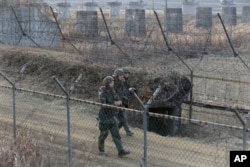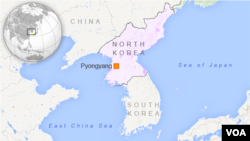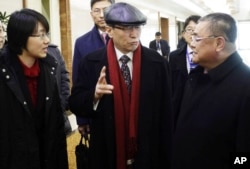Japan and South Korea joined the United States Wednesday in demanding that North Korea cancel plans to send a long-range rocket into space, saying the launch would violate United Nations resolutions banning ballistic-missile and nuclear weapon development in the country.
North Korea notified U.N. agencies late Tuesday its plans to launch what it calls an "Earth observation satellite" sometime between February 8-25.
Pyongyang maintains it has a sovereign right to pursue a space program by launching rockets, but Japanese Prime Minister Shinzo Abe and other U.S. allies have denounced the program as a hostile pretense intended to circumvent international restrictions.
'It's a provocation'
"This has been a meaning actually for a ballistic-missile test. In addition to the nuclear tests, North Korea testing these ballistic missiles is an obvious violation of Security Council decisions. In terms of important security decisions for our country, it's a provocation," Abe said.
His government Wednesday ordered the military to shoot down any North Korean rocket that threatens Japan.
Pyongyang conducted its fourth nuclear test January 6.
North Korea last launched a long-range rocket in December 2012 shortly before conducting its third nuclear test.
South Korea cautioned the North will face serious consequences if it proceeds with the launch.
"We strongly warn that the North will pay a severe price if it goes ahead with the long-range missile launch plan, which is a grave threat to peace not only in the Korean peninsula but also this region and around the world," said Cho Tae-yong, senior security official at the South Korean presidential office.
Limited diplomatic options
China Wednesday said it was extremely concerned by the reports of an impending North Korean missile launch. Foreign Ministry Spokesman Lu Kang said Beijing has called on Pyongyang to exercise restraint.
The U.S. and its allies are already pressing a reluctant Beijing to support harsh U.N. sanctions in response to Pyongyang’s recent nuclear test, there are few diplomatic options available to compel the Kim Jong Un government to stop.
“I think there is nothing for the U.S., Japan and South Korea to do other than releasing statements,” said North Korean defector and analyst Ahn Chan-il with the World Institute for North Korean Studies.
While Washington and Beijing agree on the need for a “strong” United Nations resolution against North Korea, they remain divided over the degree of severity the punitive measures should take.
The United States is advocating for stronger international sanctions that impose real economic pain by restricting shipping, aviation, and trade of resources, including coal and fuel.
The U.S. Congress is also working on unilateral sanctions legislation that would target third parties, companies and banks, many in China, that do business with North Korea. If utilized, these measures would almost certainly increase tensions between Washington and Beijing.
China, as the North’s chief benefactor and trading partner, wants a compromise approach that would impose some punishments on the Pyongyang leadership but would also lead all sides toward resuming international negotiations.
In early 2009, Pyongyang withdrew from “six-party talks” with Washington, Seoul, Tokyo, Beijing and Moscow to dismantle its nuclear weapons program in exchange for economic assistance and security guarantees.
China's top nuclear envoy, Wu Dawei, arrived in Pyongyang Tuesday to discuss the situation just as North Korea announced the rocket launch.
Military options limited
Analysts believe the planned launch is part of North Korea’s ongoing program to develop intercontinental nuclear missiles that could potentially target the U.S. mainland.
Japan’s Defense Ministry on Wednesday ordered ballistic-missile defense units, including Aegis destroyers in the Sea of Japan and Patriot missile batteries onshore, to be ready to shoot down any North Korean rocket that threatened Japan.
However it is unlikely that U.S. or South Korean forces would attempt a preemptive airstrike against the North.
“No one is seriously contemplating force to destroy the missile on the ground before the launch or something like that because the cascading effects and the consequences of that would be costly for everyone,” said Daniel Pinkston, a lecturer in international relations with Troy University in Seoul.
North Korea is believed to have over 1,000 Soviet-model missiles that can reach targets in South Korea and Japan, and enough plutonium to make eight to 12 nuclear bombs.
Last year U.S. military authorities said they believe North Korea has the ability to miniaturize a nuclear warhead to fit on a KN-08 long range missile, although North Korea has not yet demonstrated this capability.








